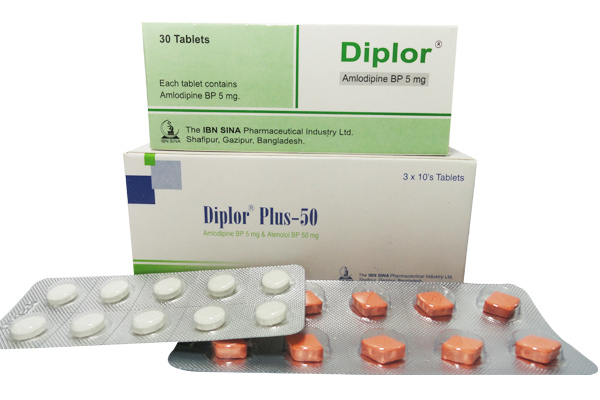
DIPLOR PLUS
AMLODIPIN BESILATE BP + ATENOLOL BP
| NAME | STRENGTH | PACK SIZE | DOSAGE FORM |
|---|---|---|---|
| DIPLOR PLUS 5 MG + 50 MG | 5 MG + 50 MG | 30 S | TABLET |
Diplor Plus 25 Tablet: Each tablet contains Amlodipine besilate equivalent to Amlodipine BP 5mg and Atenolol BP 25 mg. Diplor Plus 50 Tablet: Each tablet contains Amlodipine besilate equivalent to Amlodipine BP 5mg and Atenolol BP 50 mg.
Diplor Plus is a fixed-dose combination of Amlodipine BP & Atenolol BP. Amlodipine besilate is a dihydropyridine calcium antagonist that inhibits the transmembrane influx of calcium ions into vascular smooth muscle and cardiac muscle. The contractile process of cardiac muscle and vascular smooth muscle are dependent upon the movement of extracellular calcium ions into these cells through specific ion channels. Amlodipine besilate inhibits calcium ion influx across cell membranes electively, with a greater effect on vascular smooth muscle cells than on cardiac muscle cells. Amlodipine is a peripheral arterial vasodilator that acts directly on vascular smooth muscle to cause a reduction in peripheral vascular resistance and reduction in blood pressure. Atenolol is phenylacetamide, a selective beta (cardioselective) blocking agent. It blocks the effects of adrenergic stimulation mediated through these receptors. The cardio-selectivity is dose related. Atenolol causes a reduction in blood pressure by lowering cardiac output, decreasing the plasma renin activity and sympathetic outflow from CNS. Atenolol also causes a reduction in myocardial oxygen demand by virtue of its negative inotropic and negative chronotropic effects.
Diplor Plus is indicated in- Patients with essential hypertention, patients with hypertension and angina pectoris as co-existing disease, in post MI patients, in patients with refractory angina pectoris where nitrate therapy has failed
Adult: The recommended dose is one tab of Diplor Plus 50 (Amlodipine 5 mg + Atenolol 50 mg) or Diplor Plus 25 (Amlodipine 5 mg + Atenolol 25 mg) once daily. Titration of dosage is recommended depending upon the therapeutic response. Elderly: It is advisable to initiate the therapy with 2 tab of Diplor Plus 50 (i.e. 2.5 mg Amlodipine & 25 mg Atenolol) once a day.
Hypersensitivity to dihydropyridine and phenylacetamide derivatives, sinus bradycardia, second and higher degree of heart block, cardiogenic shock, hypotension. Clinically significant aortic stenosis, unstable angina (excluding Prinzmetal's angina), uncontrolled heart failure. severe peripheral vascular disease (including intermittent claudication), sick sinus syndrome, metabolic acidosis, poor left ventricular function.
Renal impairment: The combination can be used in patients with renal impairment. Caution may be necessary if the creatinine clearance is less than 30 ml/min because of possible reduction in the excretion of unchanged Atenolol. Hepatic impairment: Caution may he necessary in patients with severe liver damage because of prolongation of the elimination half life of Amlodipine. Bronchospasm: Caution should be taken in patients with airway obstruction. Endocrine disorders: Atenolol may mask the symptoms of hyperthyroidism and hypoglycaemia as well as enhance the effects of hypoglycaemic agents in patients with diabetes mellitus. Drug withdrawal: Since coronary heart disease may exist without being recognised. patients should be warned against stopping the drug suddenly. Any discontinuation should be gradual and under observation.
The combination is usually well tolerated. The most common side effects are fatigue, headache. drowsiness, sleep disturbances, nausea. peripheral edema. anxiety and depression.
Pregnancy: The combination should be used in pregnancy only if the expected benefit outweighs the potential fetal risk. Lactation: The combination should not be used by nursing mothers. If it's use is necessary, breast-feeding should be stopped.
Disopyramide: Atenolol reduces the clearance of disopyrainide by 20%. Additive negative inotropic effects on the heart may be produced. Ampicillin: At doses of 1 gm and above may reduce Atenolol levels. Oral antidiabetics and insulin: Beta-blockers may decrease tissue sensitivity to insulin and inhibit insulin secretion e.g. in response to oral antidiabetics. Atenolol has less potential for these actions.
Though not documented, hypotension and less frequently congestive cardiac failure may occur in cases of overdosage. Unabsorbed drugs may be removed by gastric lavage or administration of activated charcoal. Symptomatic treatment is suggested.
Store in a cool and dry place, away from direct light. Keep out of the reach of children
Diplor Plus 25: Each box contains 3 x 10's Tablets in Alu-PVC Blister Pack. Diplor Plus 50: Each box contains 3 x 10's Tablets in Alu-PVC Blister Pack.
